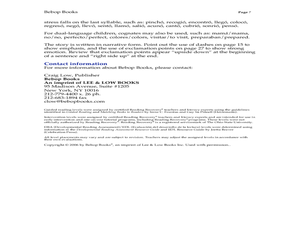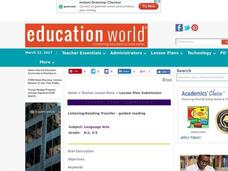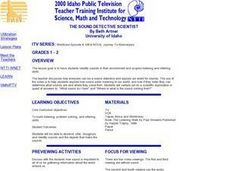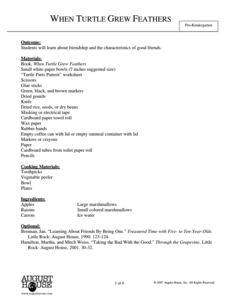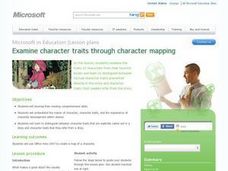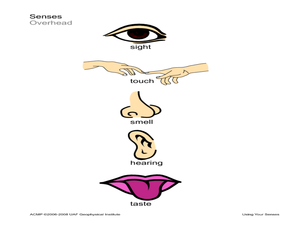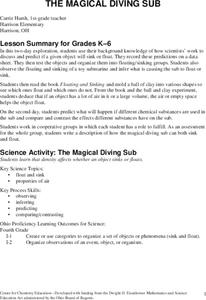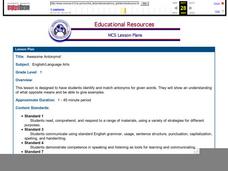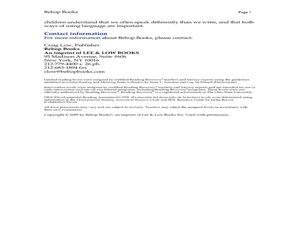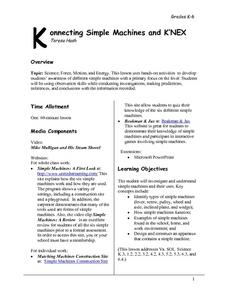Curated OER
Guided Reading with Elizabeti's Doll
Practice reading strategies using Elizabeti's Doll by Stephanie Stuve-Bodeen. Readers utilize decoding and comprehension strategies before, during, and after reading the story. A detailed list of text features, high frequency words,...
Curated OER
Listening/Reading Transfer - Guided Reading
Work on predicting and making inferences with Danny and the Dinosaur by Syd Hoff. After every few pages, the teacher asks listeners to make predictions of what will happen next. Develop critical reading strategies with your young...
Curated OER
Stone Soup
First graders examine the use of logic, deduction, and inference to determine the answers to riddles. They listen to a teacher read aloud of Heather Forest's, Stone Soup before discussing the story which gauges their comprehension....
Curated OER
Philanthropic Literature: Quilt to Freedom
A reading of Sweet Clara and the Freedom Quilt by Deborah Hopkinson launches this study of slavery, freedom, and the Underground Railroad. After a discussion of the importance of showing respect for others and of helping each other in...
Curated OER
the Sound Detective Scientist
Young scholars identify sounds in their environment and acquire listening and inferring skills.
Curated OER
"Jabberwocky": Inferring
Pupils, over an extended time, read and explain the nonsense words of Lewis Carroll's poem, "Jabberwocky". They infer the meaning of the poem using visualizing as well as decoding skills. While written for first graders, this is easily...
Curated OER
Two Greedy Bears
Improving listening comprehension skills is the goal of this language arts lesson. Young readers listen to the story Two Greedy Bears, stopping to have discussions with a partner. They predict outcomes and make inferences based on...
Curated OER
Tomas and the Library Lady
Young scholars practice read aloud comprehension strategies. In this literacy comprehension lesson, students listen to Tomas and the Library Lady, stopping to discuss with a partner aspects of the story suggested by the teacher. Young...
Curated OER
“THE LORAX” by Dr. Seuss
Few children's books convey the message of conservation as well as Dr. Seuss' The Lorax. Read the story aloud, emphasizing the interconnectedness of plants and animals in an ecosystem and discussing different ways people can help...
Curated OER
Guided Reading: Asking Questions
Here is a reading strategies lesson in which learners use post it notes to create a bulletin board. They post their new questions on the bulletin board and look back at questions they have already learned the answer to. A great idea,...
August House
When Turtle Grew Feathers
Friendship is a valuable part of growing up. Learn about the importance of friendship with a variety of activities based on When Turtle Grew Feathers by Tim Tingle. Kids practice making musical instruments, discussing plot points,...
Curated OER
What Are We Reading for Again?
Learners work to develop comprehension strategies. Through modeling and guided practice they develop a series of questions as they read Where the Wild Things Are. They apply these questions to find answers about the text and make...
Curated OER
Examining Character Traits through Character Mapping
Some of what we know about a character is directly stated. Some of what we know is inferred by events in the story. Character maps help primary learners recognize the difference. After modeling with a story your class has read, pupils...
Curated OER
Using Your Senses
Young scholars make observations. In this sensory skills lesson plan, students use their senses as well as tools that sharpen their senses to make observations regarding foods and other items.
Curated OER
Transparent Shoebox Dig
Take this simulated archaeological dig one layer at a time with your young pupils to encourage observation, critical thinking, and careful attention. Using a transparent box full of layers of sand and artifacts, pupils examine the...
Curated OER
The Magical Diving Sub
First graders discuss and predict if a given object sinks or floats. They record their predictions on a data sheet. Pupils test the objects and organize them into floating/sinking groups. Students observe the floating and sinking of a...
Curated OER
Awesome Antonyms
Review with your young learners what opposites are and use a fun tag board game called Auntie Alice to practice. After the class plays the game, pairs work on computers practicing with interactive matching/flashcards/concentration games...
All for KIDZ
Building Relationships: The Orphan of Ellis Island
Family and friendship are two very important themes of the historical fiction novel The Orphan of Ellis Island by Elvira Woodruff. From video clips and writing prompts to reader's theater and family interviews, this resource...
Curated OER
M & M Madness
M&M's are always a great manipulative to use when teaching math. In this graphing lesson plan, learners predict how many of each color of M & M's there are. They count up each color and plug the data into a graph using the...
Curated OER
Can You See It, Touch It, Hear It?
Students develop and practice observational skills through lab activity.
Curated OER
Recycling!
The students recall events from Dr. Seuss' story The Lorax and make connections to environmental issues affecting their lives. They are expected to reflect on the facts of the story and respond verbally stating the inferences they made...
Pennsylvania Department of Education
Comparing Key Ideas and Details in Fiction and Nonfiction
Students recognize the differences between fiction and nonfiction texts. In this genre study lesson, students discuss what nonfiction means and write the definition. Students listen to a read aloud and vote whether the text is fiction or...
Curated OER
Fishing Fun
Young scholars complete pre reading, writing, during reading, and interdisciplinary activities for the book Fishing Fun. In this reading lesson plan, students complete journal entries, go over vocabulary, answer short answer questions,...
Curated OER
Konnecting Simple Machines and K'Nex
Learners study and identify different types of simple machines and how they work. They design a simple machine.
Other popular searches
- Teaching Inference Skills
- Inference Skills First Grade
- Reading Inference Skills
- Powerpoint Inference Skills
- Inference Skills in Reading
- Inference Skills Worksheet
- Science Inference Skills
- Inference Skills Sixth Grade


